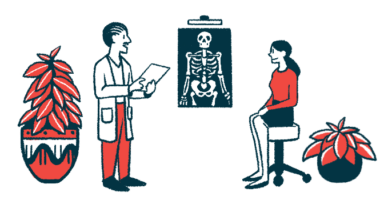Experimental T-cell antibody leads to full remission in man with AS
Patient began treatment with BCD-180, also in Phase 2 clinical trial, in 2019

A man with ankylosing spondylitis (AS) went into disease remission within three months of receiving BCD-180, an experimental antibody designed to deplete a type of immune cell called TRBV9-positive T-cells, a study reports.
He also stopped treatment with the TNF inhibitors he had taken continuously for five years, and has remained in complete remission for four years with three intravenous (into-the-vein) doses of BCD-180 a year.
The antibody is under clinical testing in ELEFTA (NCT05445076), a Phase 2 trial comparing the safety, efficacy, and pharmacological profile of two dose strengths of BCD-180 against a placebo in people with AS, ages 18 to 65, at two sites in Russia. The main study is due to finish at the close of 2025.
The study, “Targeted depletion of TRBV9+ T cells as immunotherapy in a patient with ankylosing spondylitis,” was published as a brief communication in Nature Medicine. Four of its 23 authors are employees of Biocad, the antibody’s developer.
BCD-180 is designed to bind to T-cells with a protein making them a target
Some T-cells that are primed by microbial proteins mistakenly react with other proteins in people who carry the gene coding for human leukocyte antigen B27 (HLA-B27), a protein found on the surface of immune cells and a known risk factor for AS.
These T-cells display a particular protein called TRBV9, making them a potential target for damaging anti-TRBV9 antibodies.
“Targeted elimination of the underlying cause of the disease without systemic immunosuppression could offer a new generation of safe and efficient therapies for autoimmunity,” the researchers wrote, leading them to test Biocad’s BCD-180, designed to bind to TRBV9.
In preclinical studies using rhesus macaques, a single intravenous dose of BCD-180 led to depletion of TRBV9-positive T-cells in the blood in a dose-dependent manner. This means that the higher the dose, the lower was the number of TRBV9-positive T-cells.
The depletion lasted about 90 days (three months) in monkeys treated with a higher dose of 10 milligrams (mg), then TRBV9-positive T-cells gradually began to re-emerge.
Crab-eating macaques (Macaca fascicularis) given BCD-180 at 3, 10, or 30 mg per kilogram (mg/kg) every other week for six weeks (about 1.5 months) showed depletion of TRBV9-positive T-cells within three weeks of the first dose. BCD-180 was reported to cause no evident side effects.
Researchers tested BCD-180 in the man, born in 1963 and diagnosed with AS in his 20s, who later was found to carry the HLA-B27-coding gene. His disease symptoms included stiffness, lower back pain, and difficulty moving his cervical spine (neck) and hips.
He was treated with the TNF inhibitor infliximab (sold as Remicade, with biosimilars available) to ease pain and stiffness in the spine, but the medication stopped working after five years.
He then underwent an autologous hematopoietic stem cell transplant, a procedure in which a patient’s stem cells are used to restore the body’s ability to make healthy immune cells. The transplant brought his disease into stable remission for over two years.
As symptoms came back and worsened, the man was started on different TNF inhibitors, or anti-TNF antibodies, but “each of these antibodies was effective for only 6–12 months,” the researchers wrote.
“Despite ongoing anti-TNF therapy, the patient continued to experience pain and stiffness in all parts of the spine, with severe limitation of movement in the cervical spine and pain in the hip joint,” they added.
BCD-180 treatment brought long-term remission after other approaches failed
Experimental treatment with intravenous BCD-180 at a dose of 60 mg began in March 2019. Prior to infusion, he received a single dose of the corticosteroid prednisolone, ondansetron to prevent nausea and vomiting, the antihistamine chloropyramine, and paracetamol.
Ten days later, the numbers of TRBV9-positive T-cells had dropped, whereas other T-cell populations remained unaltered. Over the first three months, stiffness and hip pain disappeared, and the man was able to increase his physical activity.
“These positive effects persisted, and the patient began active exercise therapy with an emphasis on the respiratory [breathing] muscles, the muscles of the anterior abdominal wall, and the limbs,” the researchers wrote. He also stopped anti-TNF therapy.
To further deplete TRBV9-positive T-cells, a second dose of BCD-180 at 120 mg was given in July 2019, with no side effects reported. However, symptoms began to resurface in March 2020, after a period of too much physical activity, the researchers said.
After a 160 mg dose given in May of that year, his symptoms stopped within 10 days. The patient has been receiving treatment with BCD-180 at doses ranging from 320 to 500 mg once every four months, without any noted side effects.
At the time of this reporting, the man had been in complete remission for four years.
“This intervention was successful and led to a long-term complete remission of symptoms that were not responding to existing therapeutic interventions,” the scientists concluded.







